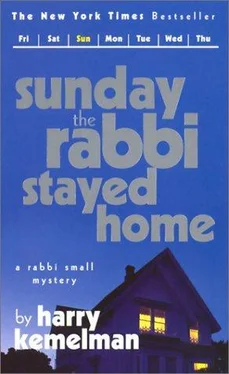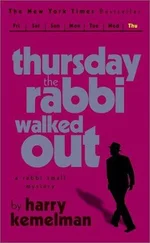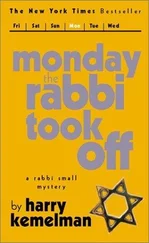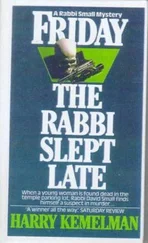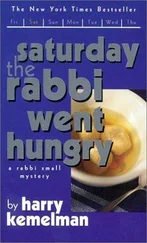Harry Kemelman - Sunday the Rabbi Stayed Home
Здесь есть возможность читать онлайн «Harry Kemelman - Sunday the Rabbi Stayed Home» весь текст электронной книги совершенно бесплатно (целиком полную версию без сокращений). В некоторых случаях можно слушать аудио, скачать через торрент в формате fb2 и присутствует краткое содержание. Город: New York, Год выпуска: 2002, ISBN: 2002, Издательство: iBooks, Жанр: Иронический детектив, на английском языке. Описание произведения, (предисловие) а так же отзывы посетителей доступны на портале библиотеки ЛибКат.
- Название:Sunday the Rabbi Stayed Home
- Автор:
- Издательство:iBooks
- Жанр:
- Год:2002
- Город:New York
- ISBN:978-0743452380
- Рейтинг книги:3 / 5. Голосов: 1
-
Избранное:Добавить в избранное
- Отзывы:
-
Ваша оценка:
- 60
- 1
- 2
- 3
- 4
- 5
Sunday the Rabbi Stayed Home: краткое содержание, описание и аннотация
Предлагаем к чтению аннотацию, описание, краткое содержание или предисловие (зависит от того, что написал сам автор книги «Sunday the Rabbi Stayed Home»). Если вы не нашли необходимую информацию о книге — напишите в комментариях, мы постараемся отыскать её.
Sunday the Rabbi Stayed Home — читать онлайн бесплатно полную книгу (весь текст) целиком
Ниже представлен текст книги, разбитый по страницам. Система сохранения места последней прочитанной страницы, позволяет с удобством читать онлайн бесплатно книгу «Sunday the Rabbi Stayed Home», без необходимости каждый раз заново искать на чём Вы остановились. Поставьте закладку, и сможете в любой момент перейти на страницу, на которой закончили чтение.
Интервал:
Закладка:
Gorfinkle nodded in appreciation. He was silent for a minute and then he said. “You know. Rabbi. I don’t think you understand what the temple is all about. I’m not sure that any rabbi ever does. They’re too much involved in it; they have a professional interest.”
“Indeed! Perhaps you can explain it to me.”
In your part of the discussion, appear frank and open, Let him feel that you are not trying to conceal anything.
Gorfinkle disregarded the rabbi’s irony. “You think of a temple as being started by a group of religious men, which once underway, draws other religious-minded people.” He shook his head. “Maybe there’s one man who is really religious, like perhaps Wasserman, but the rest are interested in it merely as an organization. And once the organization is successful—and it takes a lot of work—then the original group becomes a drag on the organization, and a different type of person has to take over. Sometimes originators get so puffed up with their success that there’s no living with them. They act as though they own the place because they started it. It rubs the new people the wrong way. That’s what happened here, and in a sense, that’s how I happen to be president. But it goes even deeper than that: To start an enterprise calls for a different set of talents than those you need to keep it going. They’re two kinds of people.”
“They’re both Jews,” the rabbi observed. “That’s only incidental Rabbi.”
“Incidental? In a synagogue?”
Gorfinkle nodded. “That’s right. You’re aware that there are two factions in the temple, mine and the one led by Meyer Paff. Now Paff, for all his Orthodoxy, isn’t terribly concerned about Judaism or religion in general. All these people who are involved with the temple, men and women both, do you think it’s because they’re religious? Or that religion is important to them?” He shook his head in violent negation. “No. Rabbi. Do you know what they’re interested in? They’re interested in the temple as an organization.
“Every man wants to be something, to be somebody. He wants a sense of achievement, of accomplishment. He’s gone to school, and he’s gone to college, and he dreamed of being somebody, of being important. Then he got himself a job or established a small business of some kind and thought at last he was on the road. And now at the age of thirty-five he realizes that he’s not going to become the President of the United States or lead an army; he’s not going to win a Nobel Prize; his wife is not a movie actress, and his children are not geniuses. He begins to realize that the business of getting up in the morning and going to work and coming home to go to sleep in order to get up in the morning to go to work—that is not going to change in any dramatic fashion. His whole life is going to be pretty much like that until he dies. And when he dies, his family will remember him, and that’s all.
“That’s a hard thing to swallow in a society like ours, where everybody starts out with the assumption that he can be President of the United States or at least a millionaire. So these people throw themselves into organization work so they can be somebody. It used to be lodges where they could wear a fancy uniform and have a fancy title, Well, lodges are a little out of fashion these days, and in a Yankee town like Barnard’s Crossing it’s not easy for newcomers. Jew or Gentile but especially Jewish newcomers, to have very much to do with the politics of the town. But here the temple is an organization that is theirs. They can do something and be somebody. There’s the temple and the Brotherhood, and for the women there is the Sisterhood and Hadassah. All they have to do is do a little work, and sooner or later they become a somebody. They become chairman of a committee, or they become an officer. They get their names in the papers. And if you don’t think that’s important, you talk to some woman who folded napkins, say, for the Hadassah luncheon and didn’t get her name mentioned along with the rest of the committee that was involved in setting it up.
“But to get back to Paff. All the time he was running things he was important. Now that he isn’t running things, he’s not important, and it irks him.”
“If it were only that.” said the rabbi mildly, “would he have contributed such large sums and done so much work and given so much time?”
Gorfinkle shrugged his shoulders. “What is a large sum to you. Rabbi, is not a large sum to Meyer Paff. You grow up to a certain standard of living. When you come into a lot of money, do you think you can change that standard very radically? You buy a bigger car, you buy an extra suit or two, and you pay a little more money for it; you have a few extra pairs of shoes, and you pay a little more money for them. It’s still nothing. There’s this vast sum of money coming in, and you’re nowhere near being able to spend it. So what do you do with it? You use it for advertising. You move out of your thirty-thousand-dollar house into a hundred-thousand-dollar mansion. You buy paintings; you get an interior decorator. Why? Because you suddenly developed artistic sensibilities? No. You’re successful, but you don’t feel any different. So you do the things that prove to other people that you’re successful. Their envy or respect make you feel like somebody. Some go in for display, and some let themselves be seen with expensive-looking women. Others, like Paff, give their money to various worthwhile institutions.”
“And you?” asked the rabbi.
If challenged, don’t hesitate to admit your own shortcomings. It makes for a better atmosphere.
Gorfinkle shrugged. “I’ll admit it. I’m no different.” He grinned. “You might even say I’m a classic example. I’m an electronics engineer. When I got through at MIT, the field was comparatively new at the time. I graduated high in my class, and I figured I’d be heading up a big electronics lab by the time I was thirty. But there was the war, for one thing, and that delayed me. Then when I did get started, I found that the promotions didn’t always go to the most able man—not in big corporate industry, anyway. Being a Jew didn’t help either. And then the Ph.D.’s began to appear on the scene—overeducated nincompoops. That didn’t help the picture. So what do you do? If you’re a married man with a child, you can’t go back to school. You shift to another job that looks as though it might lead somewhere. And it doesn’t, of course. You try again, and it doesn’t pan out either. I even switched to a small outfit where there was talk about stock options—talk—but there would be a chance to grow with the company, and the company looked as though it might grow. I even took a small cut in salary, because I figured this was my last chance. In this business, you’ve got to make it when you’re still in your thirties, or you don’t make it at all.
“For a while it looked good. And then we sold out to a big outfit, one of the giants, and I was working for a big corporation again. So now, when I’m forty-five. I’m a section head, which means I’m middle management. And that’s what I’ll probably be until I retire. I admit that when I first threw myself into temple politics, it was because I felt I could do a better job. I still think that’s part of it. But I don’t kid myself. I know that a good part of it is just to be somebody, to have an influence on the people around me.”
“Aren’t you being overcynical and missing the main point, as cynicism usually does?” the rabbi asked.
“How do you mean?”
“Well, you say that some do it by building big houses or other kinds of ostentation, while still others do it by contributing to good causes. That’s the major difference between people, isn’t it? Nowadays we’re all amateur psychologists and psychiatrists. We all presume to know the motives of men. But do we? In the last analysis, the only way you can judge by is results, and the man who uses his wealth for worthy causes, even ostentatiously, is better than the man who uses it only for ostentation. Yours is a very cynical view of the temple, if you don’t mind my saying so, Mr. Gorfinkle. But cynicism is only disappointed idealism. We Jews speak of ourselves as a nation of priests, and it would follow that if we were completely true to our ideal, we would spend all our time in the temple in study and worship. We even tried it. In the small ghetto towns of Poland and Russia, there were those who did just that. But someone had to work, and it was usually the wives. I don’t think I care for that. It’s one of my objections to the monastery and the convent. I don’t think the best way to live in the world is to avoid it. Ours is a practical religion, in which parnossah, making a living, is as important as prayer, and the world as important as the temple.”
Читать дальшеИнтервал:
Закладка:
Похожие книги на «Sunday the Rabbi Stayed Home»
Представляем Вашему вниманию похожие книги на «Sunday the Rabbi Stayed Home» списком для выбора. Мы отобрали схожую по названию и смыслу литературу в надежде предоставить читателям больше вариантов отыскать новые, интересные, ещё непрочитанные произведения.
Обсуждение, отзывы о книге «Sunday the Rabbi Stayed Home» и просто собственные мнения читателей. Оставьте ваши комментарии, напишите, что Вы думаете о произведении, его смысле или главных героях. Укажите что конкретно понравилось, а что нет, и почему Вы так считаете.
